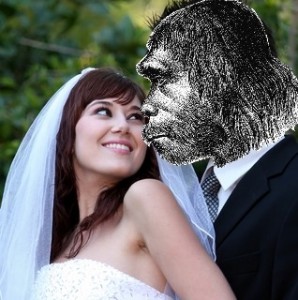You may have heard the news. Humans and Neanderthals, apparently, had sex with each other at some time. Shocking, yes, I know. But the newish technology of sequencing genomes is turning up all sorts of fascinating (and potentially scandalous) data. In NatureNews Online you can read more about it.
The researchers arrived at that conclusion by studying genetic data from 1,983 individuals from 99 populations in Africa, Europe, Asia, Oceania and the Americas. Sarah Joyce, a doctoral student working with Long, analyzed 614 microsatellite positions, which are sections of the genome that can be used like fingerprints. She then created an evolutionary tree to explain the observed genetic variation in microsatellites. The best way to explain that variation was if there were two periods of interbreeding between humans and an archaic species, such as Homo neanderthalensis or H. heidelbergensis.
Speculation over Neanderthal/Human interaction has been ongoing for a long time. Some of the idiosyncrasies of the Basque language have even been hypothesized to have resulted from such interaction, as that region of Europe seems to have been the last place Neanderthal was known to live. That they shared space—and perhaps much more—with humans is, to say the least, and intriguing notion.
Neanderthal has undergone considerable rehabilitation in the public mind since the days when they first were considered typical “cavemen” with small brains, big muscles, and no sophistry. Science has shown them more likely to have been other-than-but-no-less-than their genetic cousins, with culture, toolmaking, all the hall marks of an intelligent, advanced—and advancing—species. The idea of interbreeding follows upon this revised view, especially in light of new discoveries that a third and possibly fourth hominid species walked the Earth at the same times.
This, of course, bothers some people no end.

Over at Panda’s Thumb, Jim Foley describes at length some of the reaction from the Creationist quarter. He quotes a section of a podcast from Reasons To Believe by biochemist Dr. Fazale Rana which I feel goes to the heart of the fundamentalist problem:
If humans and Neanderthals interbred, it’s uncomfortable for the RTB view of origins, it’s not fatal by any means. It’s a bit disgusting, you know, but again you could look at that interbreeding as reflecting human depravity. … There are commands in the bible against depravity.
Depravity. A bit disgusting.
Why is it so difficult for some people to look at Nature for what it is? The insistence on applying moral judgment strikes one as, essentially, neurotic. (“We don’t invite Them to dinner, because, you know, they eat with their fingers…”)
Elsewhere I have argued that the basic difficulty Creationists have with evolution is not so much a profound belief in Biblical truth as it is a co-option of Biblical arguments to bolster an innate rejection of the idea that humans—them, specifically—are not separate from the rest of Nature. That we are special, hand-made as it were, apart from, above. Any suggestion that humans interbred with so-called “lesser” species is, to them, repugnant because it erodes what they feel is an essential distinction between humans and Everything Else. (As you read and listen to the full text of the RTB articles, you find discussions of which species had a soul and if interbreeding would diminish, supplant, compromise, or transmit that unique quality.)
What I believe, however, is not that these folks so much accept that they are, indeed, superior because god granted such status, but that they are, deep down, terrified by the unstated and largely unaddressed conclusions of evolutionary science—that humans can be replaced and quite likely will be. That Nature doesn’t give a damn about how we think of ourselves. If it turns out that we are an evolutionary dead end or that something else will come along to fill our niche more efficiently, we will not be Saved. I believe fundamentalism clings so powerfully to the myth of Genesis and works so hard in opposition to evolution because the one thing it says about us, as well as all other living things, is that we can become obsolete. We can be replaced.
There seems to me no other reason to fight so fiercely against something that continues to acquire evidentiary support, that has been verified in the lab, has been (now) witnessed in the wild. The new work on genomes adds another layer to the already profoundly solid body of knowledge that this is how life works. Moderate, rational believers have little difficulty in finding evolution to be simply another way in which the god they believe in went about the process of creation. It would seem to be only a minority of dedicated, passionate literalists who continue to rail against reality and the only reason I can find for their position is one born out of fear and insecurity.
Of course, some people just like being contrarians, so do not take this as a blanket diagnosis. But the movement itself I think is built on a rejection of the idea that humans are just part of an ongoing process that could very well see us vanish, replaced, and forgotten.
Why would a god grant us the capacity to invent him and then make us insignificant in the grand scheme of things?
A mystery, surely.


I recently had treatment by a medical care provider. They had a question about race, (which I consider to be a deeply flawed question). I filled in "Part Neanderthal" based on this new research.
http://dangerousintersection.org/2007/09/24/you-a…
Richard Dawkins comments on the one single observation that should wake up the creationists. It's the overall pattern of resemblances in the genetic codes of all living things. We are one big family tree. Humans are not "special" in this sense. Or maybe it would be easier for them if we argued that we are ALL special.
<object width="448" height="269"><param name="movie" value="http://www.youtube.com/v/TjxZ6MrBl9E&hl=en_US&fs=1&"></param><param name="allowFullScreen" value="true"></param><param name="allowscriptaccess" value="always"></param><embed src="http://www.youtube.com/v/TjxZ6MrBl9E&hl=en_US&fs=1&" type="application/x-shockwave-flash" allowscriptaccess="always" allowfullscreen="true" width="448" height="269"></embed></object>